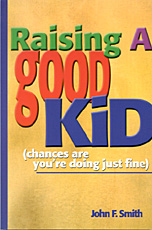A former chaplain and teacher at Groton School in Massachusetts, John F. Smith has worked with youth for 40 years as an Episcopal priest and educator. In this fine paperback resource for parents, he begins with: " 'At sea' is a good way to describe adolescence. Most kids at times feel tossed around, lost, sometimes overwhelmed by the various demands placed on them. Parents, schools, peers, contemporary youth culture, and their own changing bodies and personalities push and pull them from every direction."
Parents try to give their children compasses to guide them through a sea of troubles and challenges. Or as the author puts it, "We ache for our children to grow up as well as we can arrange it." But there is no one-size-fits-all approach. Nor is the attempt to create "designer children" fruitful. The best parents can do is to help their offspring become "good kids."
What does this term mean? Smith thinks it involves being morally healthy (knowing right from wrong), psychologically healthy (able to deal with one's feelings), physically healthy (taking care of one's body and the environment), and intellectually healthy (able to cope with the realities of the world and everyday life). The author assures parents that the same Spirit that brooded over the waters at creation is present to guide youth through the changes of adolescence.
Smith is convinced that a good kid is one who gives back as much as he or she receives: "[He] understands that his reality is bounded by others, that he is touched on every side by them, and that he has a responsibility to feed and help, to nurture the various communities in which he's involved, and which sustain him." In both parenting and in growing up, the spiritual practice of nurturing is an art that must be mastered.
